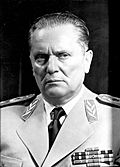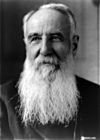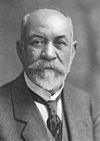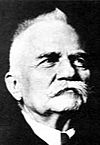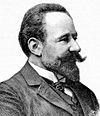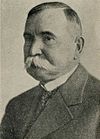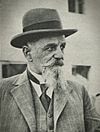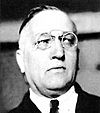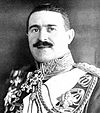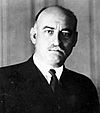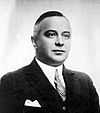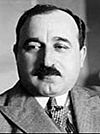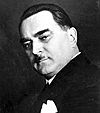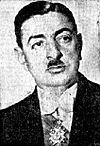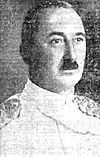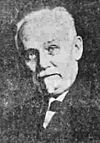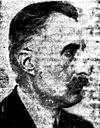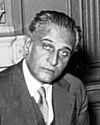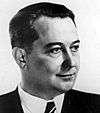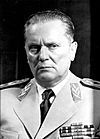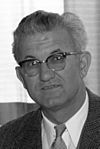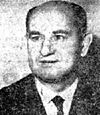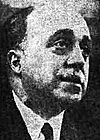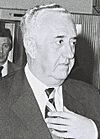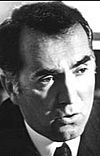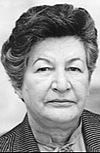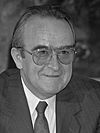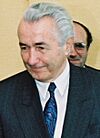Prime Minister of Yugoslavia facts for kids
Quick facts for kids Prime Minister of Yugoslavia |
|
|---|---|
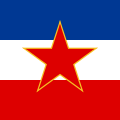
Standard of the Prime Minister
(SFR Yugoslavia) |
|
| Government of Yugoslavia | |
| Member of | Parliament of Yugoslavia |
| Reports to | King of Yugoslavia (Serbs, Croats and Slovenes) (1918–1945) President of Yugoslavia (1945–1971) Presidency of Yugoslavia (1971–1992) |
| Seat | Belgrade, Serbia |
| Nominator | King of Yugoslavia (Serbs, Croats and Slovenes) (1918–1945) Central Committee of the League of Communists of Yugoslavia (1945–1992) |
| Appointer | Parliament of Yugoslavia |
| Precursor | Prime Minister of Serbia President of the National Council of Slovenes, Croats and Serbs |
| Formation | 1 December 1918 |
| First holder | Stojan Protić |
| Final holder | Ante Marković |
| Abolished | 14 July 1992 |
| Deputy | Deputy Prime Minister of Yugoslavia |
The Prime Minister of Yugoslavia was the main leader of the government in the country of Yugoslavia. This important role existed from when Yugoslavia was first created in 1918 until the country broke apart in 1992. The Prime Minister was in charge of running the government and making sure laws were followed.
Contents
History of the Prime Minister Role
The Kingdom of Yugoslavia (1918-1941)
The country we know as Yugoslavia began on December 1, 1918. It was first called the Kingdom of Serbs, Croats and Slovenes. This new kingdom was formed by joining the Kingdom of Serbia with other areas that used to be part of Austria-Hungary.
At first, the Kingdom was a parliamentary monarchy. This means it had a king, but a parliament and a prime minister also shared power. However, on January 6, 1929, King Alexander I took full control. He stopped the parliament from meeting and ruled the country himself. This was called the 6 January Dictatorship.
On October 3, 1929, the country's name was changed to the Kingdom of Yugoslavia. Even though a new constitution was introduced in 1931, King Alexander I still ruled like an absolute monarch. He was assassinated in 1934. After his death, the country went back to being a parliamentary monarchy.
The Kingdom of Yugoslavia was defeated and taken over by Germany on April 17, 1941, during World War II. The monarchy was officially ended, and a republic was declared on November 29, 1945.
Socialist Federal Republic of Yugoslavia (1945-1992)
After Germany invaded Yugoslavia, a resistance group called the Yugoslav Partisans formed. In 1942, they created a council called AVNOJ. On November 29, 1943, AVNOJ declared the Democratic Federal Yugoslavia. They also named Josip Broz Tito as the Prime Minister of their new government, the NKOJ.
The Allies (countries fighting against Germany) soon recognized Tito. The royal government, which had gone into exile in London, was asked to join forces with Tito's government. For a short time, Yugoslavia had two recognized prime ministers: Josip Broz Tito in Yugoslavia and Ivan Šubašić leading the government-in-exile in London.
In 1944, Tito and Šubašić agreed to form one joint government, with Tito as the leader. This new government officially started on November 2, 1944, after Yugoslavia's capital, Belgrade, was freed.
After the war, Tito's political group, the People's Front, won the elections. The new parliament removed King Peter II from power on November 29, 1945. They then declared the Federal People's Republic of Yugoslavia. In 1963, the country's name changed again to the Socialist Federal Republic of Yugoslavia.
The government was led by a Prime Minister until January 14, 1953. After that, the government was reorganized into the Federal Executive Council. The person leading this council was called the "President," but many outside Yugoslavia still referred to them as "Prime Minister." Josip Broz Tito held this top position from 1944 to 1963. From 1953 onwards, he was also the President of the Republic.
Many of the heads of government during this period were of Croatian background. This included Josip Broz Tito, Mika Špiljak, Milka Planinc, Branko Mikulić, and Ante Marković.
List of Prime Ministers
People's Radical Party Democratic Party Slovene People's Party Yugoslav Radical Peasants' Democracy / Yugoslav National Party Yugoslav Radical Union Croatian Peasant Party Communist Party of Yugoslavia / League of Communists of Yugoslavia Union of Reform Forces of Yugoslavia Socialist Party of Serbia Independent
| No. | Portrait | Name (Birth–Death) |
Ethnicity | Term of office | Political party | Election | Cabinet | Notes | ||
|---|---|---|---|---|---|---|---|---|---|---|
| Took office | Left office | Time in office | ||||||||
| In the Kingdom of Yugoslavia | ||||||||||
| – | Nikola Pašić (1845–1926) Acting |
Serb | 1 December 1918 | 22 December 1918 | 21 days | NRS | – | Pašić XII | Acting prime minister, as the last prime minister of Serbia. | |
| 1 | Stojan Protić (1857–1923) |
Serb | 22 December 1918 | 16 August 1919 | 237 days | NRS | – | Protić I | First Prime Minister of the Kingdom of Serbs, Croats and Slovenes (that will be renamed to "Yugoslavia"). | |
| 2 | Ljubomir Davidović (1863–1940) |
Serb | 16 August 1919 | 19 February 1920 | 187 days | DS | – | Davidović I | . | |
| (1) | Stojan Protić (1857–1923) |
Serb | 19 February 1920 | 16 May 1920 | 87 days | NRS | – | Protić II | . | |
| 3 | Milenko Vesnić (1863–1921) |
Serb | 16 May 1920 | 1 January 1921 | 230 days | NRS | 1920 | Vesnić | . | |
| 4 | Nikola Pašić (1845–1926) |
Serb | 1 January 1921 | 28 July 1924 | 3 years, 209 days | NRS | 1923 | Pašić XIII–XIV–XV–XVI–XVII–XVIII–XIX | Second term. Vidovdan Constitution adopted on June 28, 1921. |
|
| (2) | Ljubomir Davidović (1863–1940) |
Serb | 28 July 1924 | 6 November 1924 | 101 days | DS | – | Davidović II | Second term | |
| (4) | Nikola Pašić (1845–1926) |
Serb | 6 November 1924 | 8 April 1926 | 1 year, 153 days | NRS | 1925 | Pašić XX–XXI–XXII | Third term | |
| 5 | Nikola Uzunović (1873–1954) |
Serb | 8 April 1926 | 17 April 1927 | 1 year, 9 days | NRS | – | Uzunović I–II | . | |
| 6 | Velimir Vukićević (1871–1930) |
Serb | 17 April 1927 | 28 July 1928 | 1 year, 102 days | NRS | 1927 | Vukićević I–II | Resigned after assassination attempt on opposition leader Stjepan Radić in the Parliament. | |
| 7 | Anton Korošec (1872–1940) |
Slovene | 28 July 1928 | 7 January 1929 | 163 days | SLS | – | Korošec | Appointed after the assassination attempt on Stjepan Radić, until the 6 January Dictatorship. | |
| 8 | Petar Živković (1879–1947) |
Serb | 7 January 1929 | 4 April 1932 | 3 years, 88 days | JNS | 1931 | Živković | Prime Minister during the 6 January Dictatorship. Sentenced to death in absentia in 1946. |
|
| 9 | Vojislav Marinković (1876–1935) |
Serb | 4 April 1932 | 3 July 1932 | 90 days | JNS | – | Marinković | Previously a (founding) member of the Democratic Party. | |
| 10 | Milan Srškić (1880–1937) |
Serb | 3 July 1932 | 27 January 1934 | 1 year, 208 days | JNS | – | Srškić I–II | . | |
| (5) | Nikola Uzunović (1873–1954) |
Serb | 27 January 1934 | 22 December 1934 | 329 days | JNS | – | Uzunović III | The Yugoslav Radical Peasants' Democracy party was renamed into the Yugoslav National Party. | |
| 11 | Bogoljub Jevtić (1886–1960) |
Serb | 22 December 1934 | 24 June 1935 | 184 days | JRZ JNS |
1935 | Jevtić | . | |
| 12 | Milan Stojadinović (1888–1961) |
Serb | 24 June 1935 | 5 February 1939 | 3 years, 226 days | JRZ | 1938 | Stojadinović I–II–III | . | |
| 13 | Dragiša Cvetković (1893–1969) |
Serb | 5 February 1939 | 27 March 1941 | 2 years, 50 days | JRZ | – | Cvetković I–II | Sentenced in absentia in 1945. | |
| In the Yugoslav government-in-exile | ||||||||||
| 14 | Dušan Simović (1882–1962) |
Serb | 27 March 1941 | 11 January 1942 | 290 days | Independent | – | Simović | Chief of the General Staff of the Royal Yugoslav Army. Took power by military coup d'état. He led government into exile in London. | |
| 15 | Slobodan Jovanović (1869–1958) |
Serb | 11 January 1942 | 26 June 1943 | 1 year, 166 days | Independent | – | Jovanović I-II | Headed government-in-exile. Found guilty of treason in absentia in 1946. |
|
| 16 | Miloš Trifunović (1871–1957) |
Serb | 26 June 1943 | 10 August 1943 | 45 days | NRS | – | Trifunović | Headed government-in-exile | |
| 17 | Božidar Purić (1891–1977) |
Serb | 10 August 1943 | 8 July 1944 | 333 days | Independent | – | Purić | Headed government-in-exile | |
| 18 | Ivan Šubašić (1892–1955) |
Croat | 8 July 1944 | 2 November 1944 | 117 days | HSS | – | Šubašić | Headed government-in-exile. Merged into coalition government on November 2, 1944, with Josip Broz Tito presiding. |
|
| In the Socialist Federal Republic of Yugoslavia | ||||||||||
| 19 (1) |
Josip Broz Tito (1892–1980) |
Croat | 2 November 1944 | 29 June 1963 | 18 years, 239 days | SKJ SKJ |
1945 1950 1953 1958 1963 |
Tito I–II–III–IV–V–VI | Held post simultaneously (as head of the NKOJ) first with Božidar Purić, then Ivan Šubašić. Headed joint coalition government. | |
| 20 (2) |
Petar Stambolić (1912–2007) |
Serb | 29 June 1963 | 16 May 1967 | 3 years, 321 days | SKJ | – | Stambolić | . | |
| 21 (3) |
Mika Špiljak (1916–2007) |
Croat | 16 May 1967 | 18 May 1969 | 2 years, 2 days | SKJ | – | Špiljak | . | |
| 22 (4) |
Mitja Ribičič (1919–2013) |
Slovene | 18 May 1969 | 30 July 1971 | 2 years, 73 days | SKJ | 1969 | Ribičič | . | |
| 23 (5) |
Džemal Bijedić (1917–1977) |
Bosniak | 30 July 1971 | 18 January 1977 † | 5 years, 172 days | SKJ | 1974 | Bijedić I-II | Killed in a plane crash. | |
| 24 (6) |
Veselin Đuranović (1925–1997) |
Montenegrin | 18 January 1977 | 16 May 1982 | 5 years, 118 days | SKJ | 1978 | Đuranović | . | |
| 25 (7) |
Milka Planinc (1924–2010) |
Croat | 16 May 1982 | 15 May 1986 | 3 years, 364 days | SKJ | 1982 | Planinc | First female head of the government. | |
| 26 (8) |
Branko Mikulić (1928–1994) |
Croat | 15 May 1986 | 16 March 1989 | 2 years, 305 days | SKJ | 1986 | Mikulić | Resigned on 30 December 1988, amid widespread protests. | |
| 27 (9) |
Ante Marković (1924–2011) |
Croat | 16 March 1989 | 20 December 1991 | 2 years, 279 days | SKJ Union of Reform Forces of Yugoslavia |
1989 | Marković | Last prime minister of Yugoslavia. League of Communists was dissolved in 1990, Marković formed his own party. |
|
| – | Aleksandar Mitrović (1933–2012) Acting |
Serb | 20 December 1991 | 14 July 1992 | 207 days | SPS | – | Marković | Acting prime minister. Installed by Serbia and Montenegro. |
|
Timeline
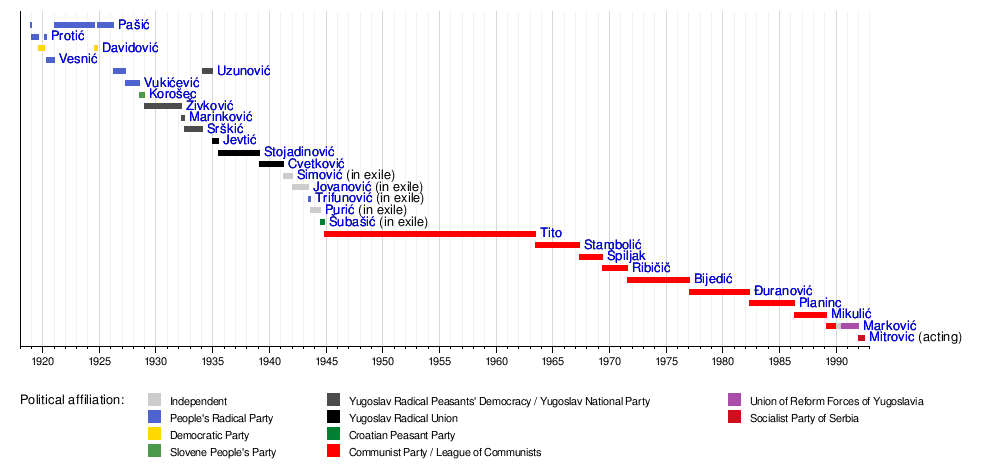
See also
 In Spanish: Primer ministro de Yugoslavia para niños
In Spanish: Primer ministro de Yugoslavia para niños
- Deputy Prime Minister of Yugoslavia
- List of heads of state of Yugoslavia
- Prime Minister of Serbia and Montenegro
- Chairman of the Council of Ministers of Bosnia and Herzegovina
- Prime Minister of Croatia
- Prime Minister of Montenegro
- Prime Minister of North Macedonia
- Prime Minister of Serbia
- Prime Minister of Slovenia
 | Jewel Prestage |
 | Ella Baker |
 | Fannie Lou Hamer |


